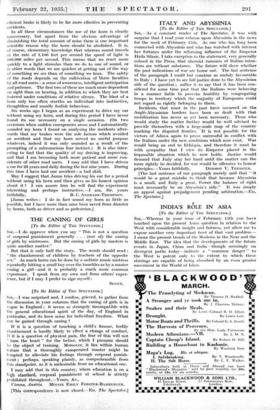ITALY AND ABYSSINIA
[To the Editor of THE SPECTATOR.] SIR,—As a constant reader of The Spectator, it was with surprise that I read your column upon Abyssinia in the news for the week of February 15th. As one who has long been connected with Abyssinia and who has watched with interest her fortunes under the reforming influence of the Emperor Haile Silasie, I take exception to the statement, very generally echoed in the Press, that alarmist rumours of Italian inten- tions are without substance. The future will show whether the past indications of war are borne out. The last sentence of the paragraph I could but construe as unduly favourable to Italy : I have yet to see full justice done to the Abyssinian side of the question ; suffice it to say that it has been con- sidered for some time past that the Italians were behaving in a manner liable to provoke hostility by congregating troops in territory which the majority of Europeans could not regard as rightly belonging to them.
Incidents that must in the past have occurred on the Ang15-Abyssinian borders have been so dealt with that mobilization has never as yet been necessary. Those who would study the matter further would be well advised to provide themselves with a large-scale map of the country marking the disputed frontier. .1t is not possible for the victors of Adava again to prove successful in conflict with the Italians under the new conditions which now exist. War would bring an end to Ethiopia, and therefore it must be with sympathy that I view its Emperor placed in the impossible situation which he now holds. Justice would demand that Italy stay her hand until the matter can the more rightly be decided, for war would be offensive to honest [The last sentence of our paragraph merely said that "it would be a great mistake to think that because Abyssinia is a small, and Italy. a great, Power the balance of right must necessarily be ,on Abyssinia's side." It was simply an appeal against prejudgement pending arbitration.—En. The Spectator.]


















































 Previous page
Previous page